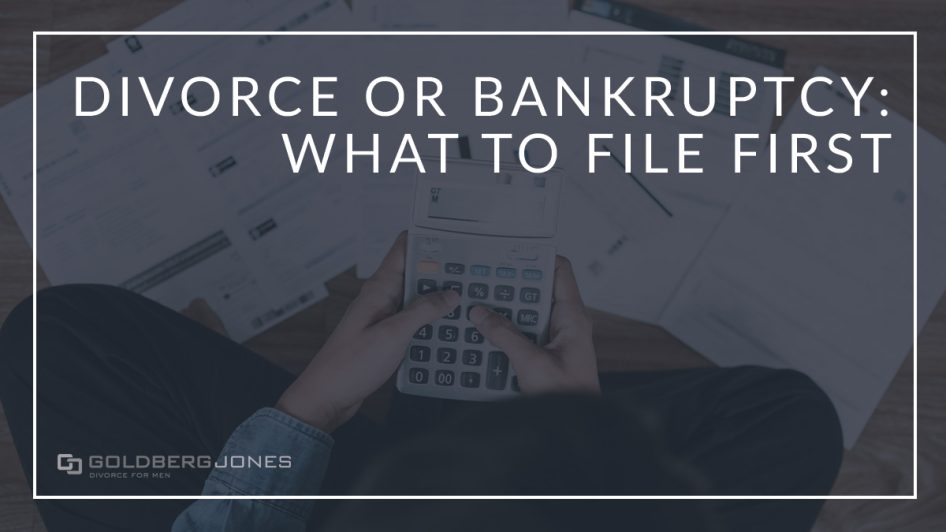Debt is an unfortunate part of many of our lives. And our marriages. Loans, credit card bills, medical expenses, and more add up quickly. Before long, we’re struggling to stay afloat. In many cases, filing for bankruptcy is the best available option. But how does it impact divorce?
The short answer is that it complicates divorce in a variety of ways. A big question that often arises in this situation is when to declare bankruptcy. Should you file before divorce proceedings, wait until things are wrapped up, or can the two coincide?
Can You File For Bankruptcy During A Divorce?
Though you have options and many factors to consider when it comes to both bankruptcy and divorce, our attorneys usually advise tackling the financial matter first. Every situation is different, but in a general sense, getting that done and out of the way is the best idea.
In Washington, you have to file either before or after divorce, you can’t file during the process. If you’re in the process of ending your marriage and begin bankruptcy proceedings, you can’t finalize the divorce.
You have to wait until the financial issue is settled and put to bed to make your split official.
Related Reading: Protecting Your Credit During and After Divorce
Why Should You File Before Divorce?
Washington is a community property state. This means all assets acquired during a marriage are viewed as belonging equally to both spouses.
When it comes to divorce and the division of property, debt is treated the same way and split along the same lines.
Related Reading: Is There a Benefit to Filing for Divorce First?
If You Agree To Pay A Debt Can You File For Bankruptcy After the Divorce Is Final?
Some people may take on all of the debt in the divorce settlement, planning to file bankruptcy after the fact. They hope this will get rid of unsecured obligations. While that may sound like a sensible solution if you’re in a deep financial hole, it presents problems.
Even if you take on all the shared debt in the divorce settlement and then file bankruptcy, creditors can still go after your ex. They’re not bankrupt after all and remain on those documents. If they want, they can then come after you through a hold harmless clause.
A hold harmless clause is a provision where if a creditor comes after you or your ex for money both of you owe—for example, a mortgage on a house or shared credit card debt—but that one of you takes responsibility for in the divorce, the party relieved of the burden can seek restitution.
In an instance like this, waiting to file bankruptcy until after divorce can backfire. You went through all the rigmarole, dealt with all of the headaches and consequences, and still damaged your credit. On top of all of that, you ultimately didn’t accomplish much of anything.
Related Reading: High Asset Divorce Mistakes
Can They Affect Divorce Costs?
You may also want to take into account the cost of paperwork when filing for bankruptcy. Joint and individual filing costs are the same, so it may be in your best interest for you and your spouse to file together while still married. In this way, you can save money in the long run.
Related Reading: How Major Purchases Can Damage a Divorce
What Types Of Bankruptcies Are There?
There are multiple types of bankruptcy to consider, and the consequences of each are vastly different.
- Chapter 7 is the most common form. This is a liquidation bankruptcy, which means assets are converted to cash and used to repay creditors.
Most often, people use this to get rid of credit card bills, medical payments, and the like. In this form, it’s also a much shorter process. It can be completed quickly, before a divorce, and you may receive a discharge in only a few months. - Chapter 13 bankruptcy, on the other hand, lingers. This option takes much longer, usually between three and five years. The reason for this is that you ultimately have to pay back all or at least some of what you owe through a repayment plan.
Related Reading: How Do Courts Handle Debt in Divorce?
Division Of Property And Bankruptcy
If you complete the bankruptcy process before filing for divorce, it also simplifies the division of property.
In Washington, couples filing jointly are, except in certain circumstances, each allowed to claim a full set of exemptions.
Going through the process together can protect a greater portion of the assets. But even then, there will likely be less to split up.
Divorce is a tricky business. Bankruptcy is a tricky business. When the two combine, things get even messier. Going through either process, you’ll likely be best served by enlisting an experienced attorney on both the financial and divorce side.
Related Reading: How Does Property Division Work In Washington State?
